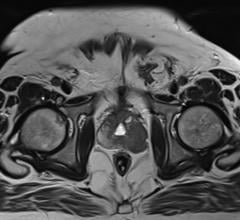June 20, 2011 — Evaluating patients with multiple sclerosis (MS) who have narrowed jugular and azygos veins—and the value of widening those veins with angioplasty—warrants careful, well-designed research, noted members of a Society of Interventional Radiology Foundation's (SIRF) research consensus panel. The multidisciplinary panel indicated that while specific parameters for a large-scale, pivotal multicenter trial are not now available, that type of study is the "mandatory goal" in exploring a condition called chronic cerebrospinal venous insufficiency (or CCSVI).
"Much work needs to be done to better define, explore and prove the concept of vein obstruction playing a role in causing multiple sclerosis," said Gary P. Siskin, M.D., FSIR, one of the 12 research consensus panel members. The concept of a blockage in the veins that drains blood from the brain and spinal cord and returns it to the heart (CCSVI) might contribute to MS and its symptoms — and that widening those veins with angioplasty may help lessen the severity of MS-related symptoms — is poorly understood, said Siskin, an interventional radiologist and chair of the radiology department at Albany Medical Center and the co-chair of the SIRF panel. "Continued investigation is needed in this area. Researchers are clearly very early in their understanding of both the condition and the treatment," he added.
About 500,000 people in the United States have MS, generally thought of as an incurable, disabling neurologic disease, in which a person's body attacks its own cells. Currently MS is treated with drugs that modulate or suppress the immune response believed to be central in the progression of the disease, and these drugs carry significant risk.
The special communication in the <i>Journal of Vascular and Interventional Radiology</i> noted that individuals with MS are seeking treatment for CCSVI "despite the still-limited available scientific evidence." Siskin explained that patients are learning about this therapy and the role of interventional radiology in venous angioplasty through the Internet. "Individuals are discussing it among themselves—through blogs and social networking sites—and then turning to interventional radiologists for this minimally invasive treatment," said Siskin.
To address the needs and concerns of MS patients who feel they cannot wait until definitive studies are completed, many doctors are currently offering endovascular therapy (or angioplasty) to patients with MS. These treatments are provided with the hope of helping MS patients who suffer from intractable symptoms. The work may also provide insights that improve the design of peer-reviewed studies clarifying the role of treating venous disease in MS sufferers with angioplasty (and possible stent placement), as noted in the document "Development of a Research Agenda for Evaluation of Interventional Therapies for Chronic Cerebrospinal Venous Insufficiency: Proceedings From a Multidisciplinary Research Consensus Panel."
The panel recommended that safety and efficacy trials should be conducted in well-defined and potentially smaller controlled populations under institutional review board approval and supported continued basic science studies to better understand the relationship between closed veins and the subsequent contribution of CCSVI to patients with MS. Siskin himself released details of a study in March that found that angioplasty is safe and hoped that those results would encourage additional studies for its use as a treatment option for individuals with MS. The SIRF report concluded that if such additional studies confirm initial reports in favor of CCSVI diagnosis and treatment, then large-scale, pivotal multicenter trials must be developed.
For more information: www.SIRweb.org.


 July 25, 2024
July 25, 2024 








